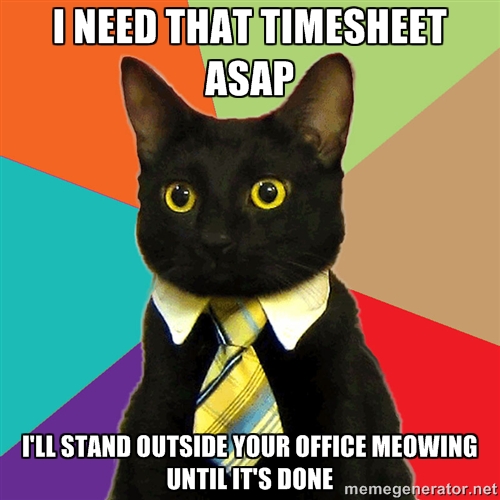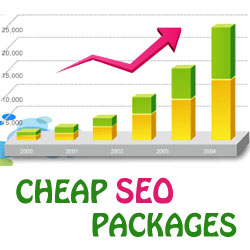
Over the past several years in the search marketing industry and business consulting space, I’ve noticed several “pet peeves” that always seem to come up. When I hear these mentioned by colleagues or clients, it always makes me cringe. Perhaps you have heard some of these or encountered them during your interactions with clients or digital consultants. If you are a business manager or client, make sure to avoid these type of interactions with your marketing partner, as they could lead to a poor working relationship.
1a. “We Need a Quote” (ASAP!)
Translation: “All service providers are the same and we will be basing our decision mainly on price. We need this quote fast so we can review dozens of different quotes side by side to see which one is the cheapest.”
While getting a few basic quotes is a good starting point to evaluate the marketplace, they don’t tell you much other than cost if that service provider hasn’t discussed your goals or past campaign performance. What’s even more challenging for digital service providers is when a client has no history of campaign performance (or goals) and wants to know “how much”? Help your marketing partner by defining goals. Not having clear business goals is going to give you quotes all over the board price wise.

1b. “ASAP!”
We know everyone is busy, but there is no reason to expect your potential marketing partner to drop all billable work and focus on your proposal. Generating quotes is part of doing business but they don’t pay the bills. This is often a red flag for a bad client relationship. If you hear ASAP a lot from your client, it may be time to part ways.
2a. “We have $X to spend on a campaign.” or “We spent $X on a new website, so we don’t have a lot left for marketing.”
In the years I have talked with prospective small business clients, there always seems to be a magic number that people start out with, and its almost always $1,000. For some reason, they feel that $1k per month is the most they need to spend to achieve the results they are looking to get. If they want to be on the first page in Google for all things related to “blue widgets”, then $1k each month should be plenty of spend to reach that goal.
Perhaps this budget is based on how much they spent on their website? This is just a guess. If they spent $12,000 on a website, break that out into 12 months, that’s $1,000 a month. So, *logically* if we only spent $12k on our website, why on earth would we spend $3k+ per month on marketing? Sounds crazy, right?! The cost of building a website and marketing a website do not go hand in hand. You can have a very basic website in a competitive niche, that requires several 1,000s of dollars to generate leads or sales. Think of almost anything “legal” or “pharma” related with CPCs around $30-50 per click and you get the picture.
Many times a clients’ budget and clients’ expectations are completely out of sync. If “blue widgets” is a super competitive industry, getting found in Google for all your “blue widgets” could take several months or years with a $1k budget. As a client, can you wait 12-24+ months to reach any of your goals? If the answer is no, then you need to invest more than $1k. Setting your budget too low can setup your campaigns to fail.
2b. …which brings to mind (cheap) package SEO and SEM companies.

Let’s say you’re a small business looking for help with SEM but don’t have a large paid media budget. Does a $500 per month fee sound OK to manage your Google paid campaign? Some business owners would say “yes”, others would think “this is too good to be true”. Will this package priced SEM company align your SEM strategy with your goals? Maybe, but most likely not. They sold you on the cheaper cost to manage your campaigns, not on the ability to help you reach your goals by maximizing your ad spend. See the difference? Since many of these cheap SEM and SEO services rely on automated bidding and software, they tend to generate a lot of unqualified clicks (aka wasted ad spend). So if you’re already low on budget, why would you want to waste ad spend using automated services? Doesn’t make a lot of sense to me.
Start with your business goals in mind, then work your cost from those goals. If the cost to run the campaigns more than pays for itself in ROI, then its a win-win. Smart business owners don’t look for the cheapest solution in the marketplace.
3. “How is our traffic doing?”
Well, there’s a bad backup on 480 East to 77 South. I would take the Jennings Freeway, but seriously.

A websites’ traffic (or visitor sessions) can fluctuate from day to day or week to week. Sometimes a website can have a 10-15% decline one month due to seasonality or slowdown in general Internet activity. One of the hardest concepts for clients’ (and some agency consultants) to wrap their heads around is trends. If your website is gaining ground year-over-year, then you’re in good shape. If it’s losing ground year-over-year, then you need to dig deeper into why.
A 5-15% drop in traffic can be related to Google organic search updates or changes to paid media placement (or several other unrelated factors) out of the control of any one person or agency. Organic search, paid search, and social media are very unpredictable week to week, this is why there is a need to focus more on trends.
If you see a significant drop of 25-50% or more, there could be a more serious problem. Check to make sure you have the Google Analytics tag in place correctly. Have you made any technical changes lately? These are just a few reasons why your traffic may change month to month with no apparent algorithmic change.
4. “That should only take 15 minutes.”
If you’ve worked in the web design or programming space, this one always “gets my goat”. Sometimes clients looking to save money on website maintenance will do the estimating for the agency. Changes to a website that impact usability, organic performance, etc. should be made after doing research. Changes to website code, a database, or scripts are rarely a 15 minute affair.
5. “Our old agency only charges $X for Y.”
Now I’m sure your old agency was great at what they do (which is why you’re looking for or signed on with a new partner). Why would you expect to get better results from a new agency for the same cost? Shouldn’t that new agency or partner be a little better than the old one and thus charge a premium for their services? Most good agencies or consultants will be in the same general range cost wise for their services. Getting your marketing partner to drop their rates before they work on your project isn’t a great way to start a relationship. What priority will your work take if they are charging another client more for the same services?
photo credit: Broadway Reclaimed (license)
